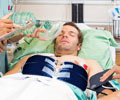Cardiac arrest is very common in North America with an estimated 400,000 people falling a victim each year.
Cardiac arrest is very common in North America with an estimated 400,000 people falling a victim each year. However only 30 percent of these people have their hearts pumping again and only 6 percent are able to recover fully. One of the main causes of death after the heart is restarted is brain injury.
In a paper presented at the 2006 Society for Academic Emergency Medicine Annual Meeting, May 18-21, in San Francisco, investigators from the University of Pittsburgh discussed the results of an animal model study to evaluate whether the simpler procedure might provide equivalent benefit.Cooling a person by 3-4 ºC during the first day after resuscitation has been demonstrated to improve the odds of a good recovery, but few patients receive this therapy. There may be fear of complications or logistical difficulties in carrying out the therapy in most hospitals. Practically speaking, cooling a person by 2 ºC is more manageable than cooling by 4 ºC.
By using rats that had been anesthetized and subjected to cardiac arrest, the severity and duration of brain injury observed in humans was replicated. The rats were resuscitated with chest compression and epinephrine, and cranial temperatures were monitored and controlled at 37 ºC (normal), 35 ºC (2 ºC cooling) and 33 ºC (4 ºC cooling). Neurological scores were measured daily, and at the end of 14 days, their brains were examined for damage.
Rats cooled to 33 ºC did best, as measured by neurological scores, median days to return to normal, and neuron density in the hippocampus. The 35ºC group had somewhat lower results while the normal group had the worst outcomes. Overall, the benefit of cooling only 2 ºC was similar to 4 ºC cooling. These results suggest that even modest cooling of the brain might have significant benefit to humans who have been resuscitated after cardiac arrest.
Contact: Linda Gruner [email protected] 212-633-3923 Society for Academic Emergency Medicine Source: Eurekalert











